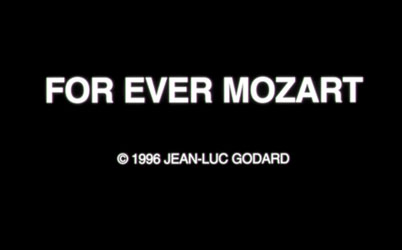
 BUY FROM AMAZON: CLICK HERE!
BUY FROM AMAZON: CLICK HERE!
MSRP $39.98
RATED UR
STUDIO Cohen Media Group
RUNNING TIME 85 Minutes
SPECIAL FEATURES
• Four Interview Featurettes
• Film Critic Commentary
• Booklet Essay
• 2013 Re-release Trailer
The Pitch
Ce n’est pas un film.
The Humans
Jean-Luc Godard, Madeleine Assas, Ghalia Lacroix, Vicky Messica, Frédéric Pierrot
The Nutshell
Jean-Luc Godard’s densely packed rumination on the need to create order and beauty in a world ruled by chaos is divided into four distinct but tangentially related stories, including the attempts by Camille, Jérôme, and Djamila, a young group of idealists, to stage a play in war-torn Sarajevo, and an elderly director’s efforts to complete his film.

A very odd thing to be written on a map, indeed.
The Lowdown
Hi, I’m Travis, and I’m a college dropout. I didn’t get the chance to study French New Wave in school. Hell, I never even took a college-level film class. Before I dropped out, I was aware of Jean-Luc Godard, and I had a vague understanding of his filmography, but I’m somewhat ashamed to say that For Ever Mozart is my first Godard film. The closest I ever got to studying him was taking a semester-and-a-half of French. These days, I consider myself a film student in perpetuity, but I’m the one who’s tasked with making the curriculum. I never had the courage to put him on the syllabus until now.
When I got the opportunity to review two Godard films on Cohen Collection Blu-Ray, I gladly accepted. My review copies arrived in the mail, and when it came time to watch For Ever Mozart, I sat down with my notepad and anxiously pushed ‘PLAY’. Ten confusing minutes later, I had to stop. The subtitles didn’t seem to be working properly, and would intermittently cut out. To make matters worse, Godard has a habit of overlapping dialogue from one scene onto another, making for a strange torrent of competing sounds. My semester-and-a-half of French allowed me to pick up phrases here and there, but I couldn’t keep watching the film if the damned subtitles were only gonna work half the time. Irritated, I went to the computer, and did a Google search for ‘For Ever Mozart Blu-Ray Subtitles’. After a little digging, I found that a portion of the film’s French dialogue (and all of its non-French dialogue) was left intentionally unsubtitled. “Fuck.” I said aloud. Thus began my frustrating journey with For Ever Mozart.

“And that’s why you don’t see Grandma anymore.”
One of my all-time favorite questions to be asked during a movie is this one : “Is the whole movie like this?” I usually hear it when I show somebody a really bad movie, in which case I can grin and nod. Several minutes after resuming For Ever Mozart, I was asking myself that question. Then, a queasy, anxious feeling began to creep in: I’m out of my league. I’m not qualified to write about this film. I can’t have an opinion on what I just don’t understand. I feel inadequate.
In an effort to understand what the hell was going on, to get some inclination as to what I was supposed to be feeling, I changed the audio track to film critic James Quandt’s commentary. I listened for a few minutes, and had to stop again. It wasn’t right. I wanted to form my own opinion on the film, based on my first impressions alone. On first viewing, I shouldn’t be worried about Godard’s intentions as a filmmaker. Adam Savage’s words from his recent SXSW keynote rang in my head: “There is no invalid response to art. The only wrong response is the one you borrow from another and when you let someone else tell you what to think.” This isn’t a film class exam, so I’m not going to be regurgitating another scholar’s observations in an attempt to seem educated on the matter. I would be doing you a disservice if I didn’t tell you how this film really made me feel. I could make up some bullshit about how I understood everything the film was trying to say, but I’d be lying, and I don’t lie to my readers.

“… because they don’t stop showing For Ever Mozart.”
For Ever Mozart, as far as I can tell, is Godard’s attempt to explore the places of art and philosophy during the Bosnian War. The film ruminates on these three heady, very stereotypically European concepts of art, philosophy, and war. I don’t mean sterotypical in the sense the concepts themselves are stereotypically European, but that Europeans have views on art, philosophy, and war that one could consider stereotypically European. Godard strings these three concepts together in a very disjointed manner, as our main group of characters are dragged haltingly towards Sarajevo. We have these tortured, cigarette-smoking, misunderstood artists, who are constantly making existentialist remarks, and are all deeply troubled by the idea of a war-torn Europe.
Godard is not subtle with his navel-gazing ennui, like when Camille says to her fellow travelers that they’re going to discuss philosophy later that night. Godard initially pokes fun at the idea, when Jérôme jokingly replies, “I think, therefore I am.” Camille rolls her eyes, but then dives right into dissecting Descartes, contemplating the abstract, disconnected nature of thought in relation to the body. Godard isn’t beating around the bush here. He just wants to get into it, as if the film were merely an excuse for getting people other than himself to spout his inward-facing questions out into the void.

Yeah. Whatever, Camille.
But if we start to view this through the filter of auteur theory, then perhaps the film is a thinly veiled slice of Godard’s brain, exposed to the audience. Like many of our own brains, it’s a jumble of images and noise that isn’t formed into a traditional narrative. We seek to impose a narrative, we seek order, but Godard’s playful (tormenting) love of the seemingly arbitrary prevails. There’s a scene early in film in which an argument breaks out over a dining table. What are they arguing about? War, of course! The filmmaker character, Vitalis, compares Europe’s seemingly neverending parade of land wars to the persistence of Ravel’s Bolero (a reference I understood because I was a band nerd), which tells us why the film-within-a-film is called Le Bolero Fatal. Suddenly, the sound of a jet engine rudely screams through the scene without explanation. I laughed. It’s a moment of pure indulgence, a moment of “I’ll do whatever the fuck I want, I’m the goddamned director!” There’s a lot of moments like this in For Ever Mozart, and some of them are intentionally quite funny, if you can embrace the absurdity of it all.
I will say that after the fifty-minute mark, after Djamila gets through her ordeal with the soldiers, the film switches gears to become a more outright critique of the business of cinema and the process of film production. I began to relax. I’m much more at home with talk of moviemaking. In this section, the absurd aspects of the film become much more pronounced, as Baron Felix sits in a casino gambling away his money, all while he begrudgingly signs the checks to pay the actors and film crew. His assistant Sabine does “homework”, which involves transcribing a cassette tape of the most vile sex talk I’ve ever heard. “Piss up my crack! Butt-fuck me to death!” To say that it is weird would be trite: It transcends weirdness. It sublimates into pure hilarity.

I said, “your hat looks fucking stupid”.
To the film’s credit, I do think it contains some valuable observations about film as an art, and what we expect from cinema as artists or as an audience, though the film has an obvious cynical slant. For example, the film director character in For Ever Mozart is referred to as Vitalis during the film, but listed in the credits as “Metteur en Scene”, an André Bazin term for a director that is technically skilled, but with no distinguishable auteur trademarks. I guess we could call these directors hired guns, or we could call them Brett Ratner.
Yet for these few painfully funny and valuable moments, there is too much tedium to sift through. Too much wondering why certain characters are never named in the subtitles when their names are spoken by the characters. Too much wondering why the English translation would hide that information from us, making the characters seem nameless. Too many shots of book covers, creating a long list of increasingly obscure references, which make the film feel like a homework assignment. Too much existentialist claptrap, by which I am particularly annoyed. But is it all just a harsh reminder of my lack of higher education, amateur critic status, or pop cinema specialty? Perhaps. I have no problem admitting that. I fully understand that I’m missing the point. I never had a chance in hell of understanding everything that’s going on in For Ever Mozart.

At this point in the film, so did I.
For what it’s worth, I was much less miserable during my second viewing. Just let it be known that For Ever Mozart was one of the most difficult pills I’ve ever swallowed. I don’t like it, I don’t even know if I want to appreciate it, but I can venture a guess that if you want to start watching Jean-Luc Godard, you should start somewhere else.
The Package
In terms of the package, this is a must-buy for lovers of the film. The new, remastered transfer, while a bit soft, is quite beautiful. Presented in its native full-frame pillarboxed format, Godard’s accomplished eye for composition is evident. The muted color palette of the film is accurately portrayed. No unnatural over-sharpening is present. The 2.0 Lossless LCPM audio track is never distorted or mushy.
While the disc’s interviews and booklet’s essays are extraordinarily dry, they are nevertheless educational, and will be valuable for those looking to learn about Godard. The best feature, without which the disc would be nearly worthless to me, is James Quandt’s commentary. He is reading from notes the whole time, and the commentary has no entertainment value, but the education it provides is indispensable. It may make you feel like you’re sitting in a dry lecture, but if you’re there to learn, then learn you shall.
Rating: 




Out of a Possible 5 Stars